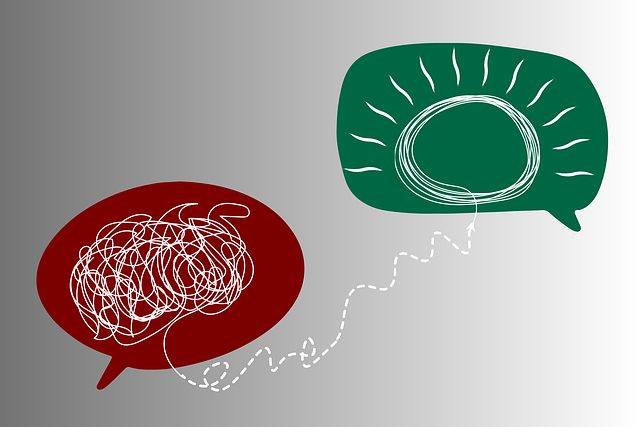The text discusses the significant impact of stigma on individuals seeking mental health support, particularly in Denver, where the bustling city landscape contrasts with the issue at hand. It highlights that negative attitudes and stereotypes discourage people from reaching out for help, emphasizing the need to understand and overcome this barrier. The solution lies in innovative programs like Denver Suicide Prevention Therapy (DSPT), which offers holistic approaches, including cognitive behavioral therapy and mindfulness practices, to reduce stigma and promote early intervention. Educational initiatives, led by professionals, dispel myths and encourage empathy, normalizing conversations about mental wellness. Community engagement through workshops and open discussions further breaks down barriers, fostering a more compassionate environment for mental health treatment in Denver.
Mental illness stigma, a silent barrier, prevents many from seeking much-needed help. This article explores comprehensive strategies to reduce this harmful impact, focusing on Denver’s innovative approach to suicide prevention therapy, holistic care models, and educational initiatives that foster empathy and dispel myths. By examining these efforts, we can catalyze positive change, ensuring those struggling with mental health issues receive the support they deserve, ultimately saving lives through effective treatment and community engagement.
- Understanding Stigma and Its Impact on Mental Health Seekers
- Denver Suicide Prevention Therapy: A Holistic Approach to Care
- Educational Initiatives: Dispelling Myths and Promoting Empathy
- Community Engagement Strategies for Lasting Change
Understanding Stigma and Its Impact on Mental Health Seekers

Stigma surrounding mental illness is a significant barrier to individuals seeking much-needed help and support. It often manifests as negative attitudes, stereotypes, and beliefs about people with mental health conditions, leading to discrimination and social isolation. This can be especially detrimental for those considering Denver Suicide Prevention Therapy or any form of specialized mental health treatment. When individuals feel stigmatized, they may hesitate to reach out, delay treatment, or even avoid seeking help altogether.
Understanding stigma is crucial in developing effective reduction strategies. The impact of stigma on mental health seekers is profound—it can create a culture of secrecy and shame, making it harder for people to acknowledge their struggles and take the courageous step towards recovery. By promoting Mind Over Matter principles, implementing Social Skills Training, and providing Crisis Intervention Guidance, we can foster an environment that supports and empowers individuals with mental illnesses, encouraging them to seek the help they deserve without fear of judgment or discrimination.
Denver Suicide Prevention Therapy: A Holistic Approach to Care

In Denver, a city known for its vibrant landscape and bustling metropolis, an innovative approach to mental health care is making waves – the Denver Suicide Prevention Therapy (DSPT). This holistic program recognizes that addressing suicide prevention goes beyond traditional therapy. It incorporates a comprehensive array of services tailored to combat burnout prevention and stress reduction methods while emphasizing the vital role of early intervention in depression prevention.
The DSPT model embraces various therapeutic techniques, from cognitive behavioral therapy to mindfulness practices, all designed to fortify individuals’ mental resilience. By focusing on both the mind and body, this approach aims to prevent and manage conditions that can lead to suicidal thoughts. Through tailored programs, the initiative ensures that folks receive the comprehensive care they need, fostering a supportive environment where mental health is prioritized, and stigma is reduced.
Educational Initiatives: Dispelling Myths and Promoting Empathy

Educational initiatives play a pivotal role in stigma reduction by empowering individuals with knowledge and fostering empathy. Programs that focus on dispelling myths surrounding mental illness are essential, as they help to counteract the misinformation prevalent in society. These initiatives often take the form of workshops, seminars, or community discussions led by mental health professionals. By engaging in open conversations, participants gain a deeper understanding of various conditions, their causes, and effective coping strategies.
Integrating compassion cultivation practices and mood management techniques into educational curricula can significantly enhance empathy and reduce stigma. Teaching individuals how to recognize signs of distress and offer support can create safer environments for those struggling with mental health issues. Such efforts are crucial in fostering a sense of community and normalizing conversations about mental wellness, ultimately encouraging individuals to seek help from Denver Suicide Prevention Therapy or other specialized services without fear of judgment.
Community Engagement Strategies for Lasting Change

In the pursuit of reducing the stigma surrounding mental illness, community engagement plays a pivotal role in fostering lasting change. Denver Suicide Prevention Therapy has been at the forefront of these efforts, recognizing that addressing mental health issues requires a collective approach. One effective strategy involves organizing community workshops and educational sessions focused on raising awareness about various mental health conditions, dispelling myths, and promoting empathy. These gatherings often include discussions on social skills training and emotional intelligence, empowering individuals to better understand and support their peers.
Moreover, initiatives that encourage open conversations in schools, workplaces, and faith-based groups can significantly contribute to breaking down barriers. By integrating coping skills development into these platforms, participants gain practical tools to manage stress and support those facing mental health challenges. Such inclusive practices not only promote early intervention but also ensure a more compassionate and informed community, ultimately reducing the stigma associated with seeking mental illness treatment in Denver.
Mental illness stigma reduction is a multifaceted process that requires understanding, education, and community engagement. By implementing holistic approaches like Denver Suicide Prevention Therapy, dispelling myths through educational initiatives, and fostering empathy through community involvement, we can create a more supportive environment for those seeking mental health care. These efforts collectively contribute to breaking down barriers and encouraging individuals to access the resources they need without fear of judgment or discrimination.













